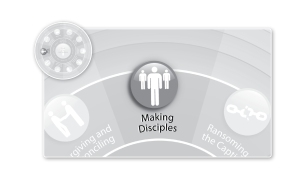Part IX of our series on Making Disciples
 We’ve been talking this week about what discipleship is not.
We’ve been talking this week about what discipleship is not.
First, we talked about how it is not therapy. As important as it may be to respond to people’s needs, which Jesus often did, he didn’t call that discipleship. Teaching others to obey everything he commanded is how he defined discipleship.
Which, of course, means it cannot be spontaneous. Discipleship must follow a plan: not just for what to talk about, but who to talk about it with. It requires more than just a table by the window at Starbucks.
Today, I want to suggest some elements of such a plan with the help of D. Michael Henderson, an author and discipler whom I’ve quoted and made reference to repeatedly this week.
He suggests a predictable and manageable four-step process for conveying discipleship curriculum.
This process is designed to keep conversations focused on pouring out and receiving the philanthropy of Christ rather than devolving into relationship chatter or—equally dangerously—endless introspection. Despite the obviously strong application this process has for things like management and human development, our focus is on how this process characterized Jesus’ relationships with people and how those who are serious about discipleship will follow suit.
Here are four elements that every discipleship conversation should contain:
- A clear goal. You don’t get to just pick one. The overarching goal is “and teach them to obey everything I’ve commanded you.” So the goal of every discipleship conversation needs to be a subset of that.
- Shared information which relates to that goal. Discipleship has real content. Teach specific, Scriptural command. Nothing fancy. Nothing cute. Just straight discipleship from the pages of Scripture.
- Strengthening of the relationship. Discipleship is more than information. Remember what we learned about Elijah and Elisha? Elisha learned by living with Elijah and following him around. That’s more than a standing weekly at Panera Bread.
- Agreement on the next steps toward the goal. “Go and sin no more” is best understood, not as a platitude, but as a prescription. What’s the plan to do the word that the discipleship just heard you share from Scripture? (“That’s deep—thanks for sharing” is not a plan!)
And Henderson points out that the discipleship continues even when the conversation is over:
“The most effective conversations share information before, during, and after the conversation itself. The people who make the most difference in other people’s lives are constantly sending each other supplementary material: books, articles, quotations, personal notes, tapes, or reports.
People who are good at this follow up their discussion with a note that reaffirms their discussion, perhaps with an enclosure—an article, a photo, or a news clipping. And, just as often, they send some information prior to actually meeting:
‘John, you mentioned your interest in serving the poor in our own community. Here’s an article on Neighborhood Networks that might give you some ideas. We can discuss it when we meet on Tuesday.'”
This requires a level of planning and diligence on the part of the teacher to undertake a curriculum at this level of intentionality, direction, and rigor.
But perhaps you’re questioning whether you have the time to invest in someone’s life that way. You have responsibilities at work, home, the gym, and your kid’s school. Not to mention a hobby, church on Sundays, and a small group.
You’re right. You probably don’t have that kind of time. Better go and bury your father first.
Jesus will understand, I’m sure.
Are there elements of a discipleship conversation you would add or take away from this list?











As an exercise, what “next steps” would you give for someone who is struggling to leave a cult?
Sounds like good advice even for missionaries!